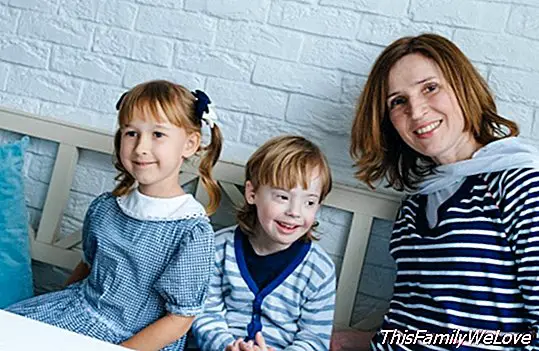How to talk with your children about Down syndrome

The Down's Syndrome It is a natural chromosomal variation that has always been part of our human condition and generates variable effects on learning, physical characteristics or the health of the people it affects. With adequate health care, access to early intervention programs and inclusive education in the cases in which it can be carried out, the development and growth of these children makes them autonomous and independent people capable of making their own decisions.
In 2011, the United Nations declared on March 21 the World Down Syndrome Day. With this celebration we want to increase public awareness of this issue and remember that people with this intellectual disability also have their inherent dignity and are a valuable contribution as promoters of the well-being and diversity of their environment.
One in 691 babies is born with Down syndrome
It is a genetic condition that appears when a child has an extra, complete or partial copy of chromosome 21. Additional genetic material alters the child's development. The cause of this extra chromosome is still unknown. The Down's Syndrome it can be diagnosed during a prenatal examination or after birth, and it can cause delays in the development of learning, in its physical aspect and some aspects of its health.
Àngels Ponce, a family therapist specializing in the disability environment, comments that "although people with Down syndrome can share some characteristics, each one will develop at their own pace according to their unique character and abilities". In addition, today there is a large number of entities and organizations that offer support, resources and information to both people with Down syndrome and their families.
How to tell your children what Down syndrome is
Maybe there are no people with Down syndrome in your environment, or maybe your children have asked you "what's wrong with that child?" if you have crossed paths with someone with these characteristics. They are children and they are curious about what they do not know.
Disability expert Ángels Ponce offers us some tips to help know and explain Down syndrome from the perspective of the little ones:
1. Children with special needs are different, and that's not bad. Children are very much attracted to everything that is "different" and many times, they show their astonishment, that is natural and adults should not feel uncomfortable about it. You may be struck by the almond-shaped eyes of children with Down syndrome, or how they speak. Given this, we should not throw their arms or cross the sidewalk. We have to answer your questions and allow them to approach them with respect.
2. Children with Down syndrome are, first and foremost, children. They want to play with others, share, laugh, make jokes and also get scared. Nothing strange.
3. They have a proper name and characteristics that go far beyond chromosome 21. Do not think that everyone is the same, it is best to know them.
4. Perhaps their way of learning is slower than that of other children, but you know, each one has its own rhythm. This does not disable them for other things: they are able to learn, love, work and also to be independent.
5. Children with Down syndrome are not sick. What children know about an illness is that it is something that appears and with some medication disappears (like a cold, for example). If you tell your children this will ask why their parents do not take them to the doctor to be cured.
6. Nor is it something that "sticks". No need to move them away in the park or on the sidewalk, there is no danger of contagion. If you act in this way, you are telling your children that it is better to "not get close" and children with Down syndrome do not need that, just the opposite.
7. Words are important. Luckily, there are some pejorative expressions that are already far away, but it is recommended that when you talk about a person with Down syndrome you do it properly. The trick is very simple: put forward your condition as a person: "child WITH Down syndrome", "person with Down syndrome", "woman with Down syndrome". Nobody IS only Down syndrome, it is also a boy or girl, a woman or a man ... with many capacities and some limitations.
8. Children ask if they see something different and that is not bad. Another thing will be that adults have the right answer. Do not worry, to say at that moment that "you do not know" but that you can find the answer together is very appropriate.
9. Find resources to talk with your children about Down syndrome or about other types of disabilities. Above all, if in your class, in the neighborhood or in the park there is a child with that characteristic.Take advantage of every opportunity to realize that not all people are equal.
10. Remember: the best example is you. The best way to teach your children to behave towards a person with a disability is to do it through your example. So come closer, say hello and show interest in that person without fear.
Àngels Ponce. Mindfulness instructor for families and family therapist within the disability environment.




